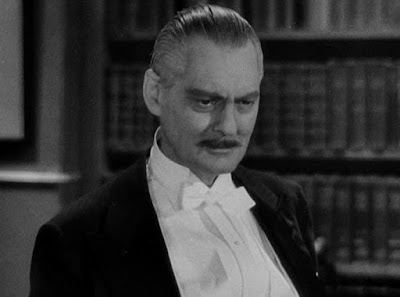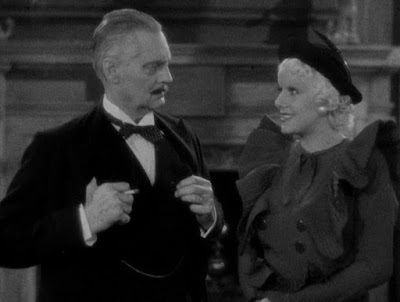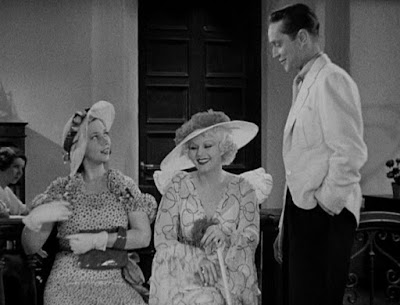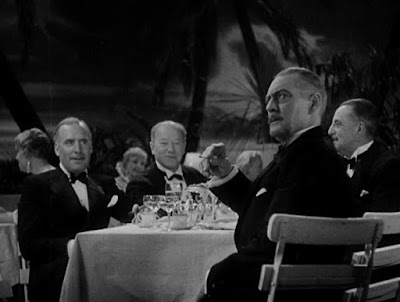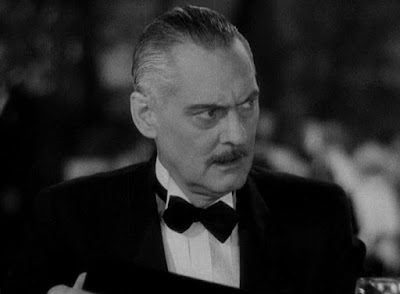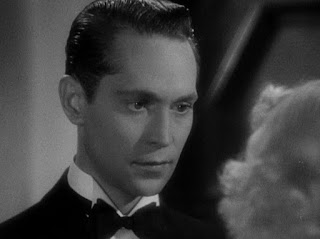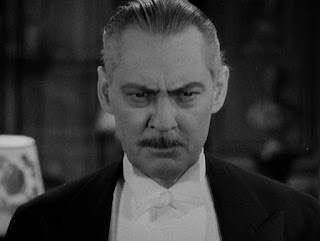Sylvia was so much more than a grouchy workaholic (look how exuberant her smile is in the candids above) and O'Brien's biography really delves into her familial and professional experiences and her dedication to her son, dogs, and career. I also think it's telling that Sylvia liked to attend celebratory film events and then criticize its attendees for living in the past. She didn't have to attend these events or be interviewed. But she did and I think it's because she secretly liked it. There were disappointments throughout her life that I believe hardened her shell a bit so that she increasingly spouted these harsh, irascible comments as a shield of protection. As a fan myself, I wish that she would've been more receptive to and outwardly appreciative of her fans' interest in her, but I must admit that I really admire how she lived her life on her own terms. I wish that I had an ounce of the audacity she possessed.
Like Franchot, Sylvia grew up in a household without financial issues and very early on dedicated herself to being an actor. Both Franchot and Sylvia could've coasted through life, but possessed the drive to embrace their own paths and be discovered through hard work on the stage instead. They would both state how disenchanted the film world made them feel at times and continuously worked at improving their skills while delivering plays with important social messages through the Group Theatre. Both Franchot and Sylvia refused to take fame too seriously and embraced their transformation into character actors. On top of their personal and professional similarities, Franchot and Sylvia simply liked each other.
Ten years before they teamed up for their Group Theatre comebacks in The Gentle People, 24-year old Franchot and 19-year-old Sylvia acted together in Cross Roads. It ran for 28 performances at the Morosco Theatre in November and December 1929. Written by Martin Flavin, the play would be adapted into the 1932 film The Age of Consent. Eric Dressler played a first-year medical student Michael who wants to quit school to marry Pat. When Pat (Sylvia Sidney) wants to wait, Michael is caught in a clandestine evening with a waitress and his life at school and with Pat is threatened.
On November 6, Variety called it a "poignant, wistful little comedy...Excellently acted, the dialog, easy and natural, and it has all been staged superbly." By November 27, the play had grossed $8,500 (Measuringworth.com rates that around 1 million today.)
The dialogue may have not been the only aspect that came "easy and natural" to its actors. Author O'Brien reveals that Franchot told interviewer Gladys Hall in 1933 that he had been "seriously in love" with a co-star:
We didn't marry, because I felt it would be unfair to the girl. She was very talented. She had a big career ahead of her. We broke it off and she has gone on, as I knew she should. She is a very successful star right now.
Although Franchot didn't name the costar, Hall then and O'Brien later guessed that Sylvia may be the girl. By 1933, Sylvia had become a big star in Hollywood. 1931 to 1933 saw Sylvia in such classics as An American Tragedy, City Streets, Merrily We Go to Hell, Street Scene, Madame Butterfly and Jennie Gerhardt. In 1934, movie magazines declared that Sylvia was the Hollywood beauty with the most ideal face. I believe that it is very likely that Franchot is referring to Sylvia in this interview. Although a great deal of his costars were very successful in theater, Sylvia's the only one of his early theater costars that comes to mind who had that level of stardom in Hollywood in 1933. Franchot had many, many love affairs—some not so serious and some very serious, some well-publicized and some very secretive. But I have a feeling he may be talking about Sylvia here, too.
In 1939 after many years focused on films, Franchot returned to the stage in The Gentle People, a Group Theatre production co-starring Sylvia. On February 6, 1939, Life magazine reported:
Where The Gentle People lags, it is supported by radiant acting from Franchot Tone, Sylvia Sidney and Sam Jaffe, all returned from Hollywood to Broadway, and from the Group company who have become past masters at U.S. realism.Variety, on January 11, 1939, reported:
Franchot Tone returned from Hollywood to play Goff, giving the part a clear reading and believable type of tough guy...Sylvia Sidney is the willful Stella, an assignment which she excellently delivers.
Franchot and Sylvia also traveled to Washington, D.C. together. They met with President Roosevelt to protest the budget cuts against the Federal Theatre Project.
Having spent a great deal of time together in 1939, Franchot and Sylvia went their separate ways but still took such similar paths. Sylvia had her son Jody with Luther Adler. In 1946, Sylvia divorced Luther and was married to Carlton Alsop from 1947 to 1951. Franchot would marry actress Jean Wallace in 1941 and have two sons. He and Jean would divorce in 1948 and he would later marry Barbara Payton and then Dolores Dorn. Franchot would balance a life in films, theater, and television as would Sylvia.
When I'm asked which two actors I'd liked to have seen in a film together, I've always immediately answered Franchot and Sylvia. I'm so disappointed that they didn't do something together in the 1930's. I think they would've been perfect in a romantic drama together. Look at Franchot's movies that include messages about the human condition and moral dilemma. I could easily picture Sylvia as Franchot's leading lady in Exclusive Story or Gentlemen are Born or Straight is the Way. Equally, I could envision Franchot as Sylvia's leading man in Street Scene, Jennie Gerhardt, and One Third of a Nation.
It seems I was almost granted my wish in the 1940's. O'Brien's book reveals that Franchot and Sylvia nearly did co-star in a film in 1946. They both signed on to co-star in the film Repeat Performance. After the film was delayed, Sylvia dropped out to film Love from a Stranger instead. Franchot would film Honeymoon, Lost Honeymoon, and Her Husband's Affairs in 1947. Repeat Performance went on to star Louis Hayward and Joan Leslie and was released in 1947. It as a film noir that includes elements of time travel and science fiction.
In 1956, Luther Adler and Sylvia reunited to co-star in the play A Very Special Baby. There was a lot of tension and bickering between the two exes and although the play was noted for Sidney and Adler's superb acting, critics found the play to be "overwrought." Playwright Robert Alan Aurthur witnessed the battles and ended up writing The Thundering Wave, an episode of Playhouse 90. The Thundering Wave was about two exes who are reunited on the stage and clashes ensue. Those two exes, based on Sylvia and Luther, were performed by Joan Bennett and....Franchot Tone.
Sources:
- "Cross Roads." Variety. November 6, 1929. pg 63.
- Doherty, Thomas. "Remembering the Hollywood Mogul who Rescued Hundreds of Germany's Jews." The Hollywood Reporter. December 29, 2015.
- "Low Tide Totals of Between Holiday Period Expected by B'way Legits." Variety. November 27, 1929. pg 59.
- O'Brien, Scott. Sylvia Sidney: Paid by the Tear. Bear Manor Media, 2016.
- Smith, Wendy. Real Life Drama: The Group Theatre and America, 1931-1940; New York: Knopf, 1990.











